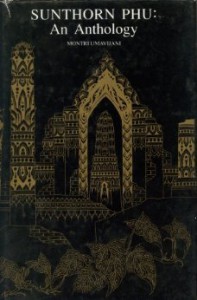Currently reading
An Anthology of Poems by Sunthorn Phu


Sunthorn Phu (1786-1855) is perhaps the only classical Thai author who is not a member of the nobility or royalty, which is one of the reasons he is known in Thailand as the "poet of the people." Up until the 20th century, Thai literature consisted of histories, poetry (including dramas) and Buddhist tracts - not at all unusual in Southeast Asia - with poetry the Queen of literature. Sunthorn Phu is considered by the Thai to be one of their greatest poets.
Literacy was not widespread in Thailand in the 18th century; if you were of the common people, as Sunthorn was, you learned a little in a temple class or not at all. However, because Sunthorn's mother was a wet nurse to one of the royal princesses, it appears he received an education at the palace and even wrote a story in verse for a royal prince at the age of 20, beginning a lifetime of service to the royal family. During the entirety of King Rama II's reign Sunthorn stood in the good graces of the king and the Crown Prince (the future Rama III), who themselves were poets in the honored Asian tradition. Though he had some problem with Rama III which removed him from the court, he later found patrons among the King's children, one of whom became the next king.
Poetry in the hands of the royalty had been formal and ornate,(*) the content much less important than the rhetorical display. Sunthorn introduced a simpler language and measured much more significance to the content of his poems; through these choices he has had a great impact on poetry in Thailand.
Though he wrote a moral tract, Swasdi Raksa, for a princeling which is still read in Thailand,(**) Sunthorn's output consisted primarily of nirats, a poetic form which uses the recounting of a voyage as a pretext for display, and a 30,000 line epic poem called Phra Abhai Mani. In Sunthorn Phu: an Anthology
https://www.goodreads.com/book/show/3829918-sunthorn-phu
one finds excerpts from Swasdi Raksa and two nirat. In the first, Nirat Phra Bat, Sunthorn follows his princely patron on a pilgrimage that takes them past the recently destroyed capital, Ayutthaya.(***) The poem is an interesting combination of concrete travelogue, meditations on various matters that occurred to him along the trip, and occasionally belabored similes used to tie the trip in with his love to his wife. The language is straightforward, but that could well be due to the translator, a Thai himself and so not widely wandered in the English language. In any case, I am rather certain that passages like the following were unknown in the royal poetics. The voyagers have left the river at Ayutthaya and are ready to continue upcountry on elephants:
Pity the court women who attend.
They lose their cases of white powder and yellow powder;
Broken combs and mirrors lie scattered on the ground,
The owners tearfully seek their belongings.
They mount the elephants with legs unparted,
Confined by both their skirts and manners.
They pull at the ropes around the elephants' necks.
But the elephants roll their trunks, and the women scream.
They clutch at other strings which snap,
So they lose balance and tumble down.
There are truly poetic moments, such as the evening the caravan reached the monastery that was their goal:
The air is full of sounds of trumpets and conch shells,
pipes, xylophones, gongs, and drums in concert,
Interspersed by an occasional peal of bells.
The sweet sound of pipes entices the heart,
Now come the drums both treble and bass.
Talking is heard in every hut.
Big trees screen moonlight.
Melodious are the sermons with questions and answers,
Which take place in the resonant field by the mountain.
A festival is improvised with a theater troupe, music and a muay thai match! Such slices of real life please me greatly.
Nirat Phukhao Thong is again a travelogue (such is a nirat) with much the same attributes as the first, except that the spousal love is replaced by Sunthorn's grief at the death of his patron, Rama II. The Swasdi Raksa is curiously strange to me, much like Leviticus is.
I really enjoyed reading these excerpts. Would someone translate everything Sunthorn wrote, please?
(*) As in Japan, the language at the royal court was quite different from that spoken in the rest of the country, employing complex compounds with Sanskrit roots which most Thai would not understand. Thai poetry used this hothouse diction heavily prior to Sunthorn's example. Indeed, one Thai prince called Sunthorn's work "market verse" because of his diction.
(**) The progressive author of Wanlaya's Love
https://www.goodreads.com/book/show/22388796-wanlaya-s-love
complains about its constrictive influence.
(***) The image above is a small version of a photo I took in Ayutthaya.
 4
4












